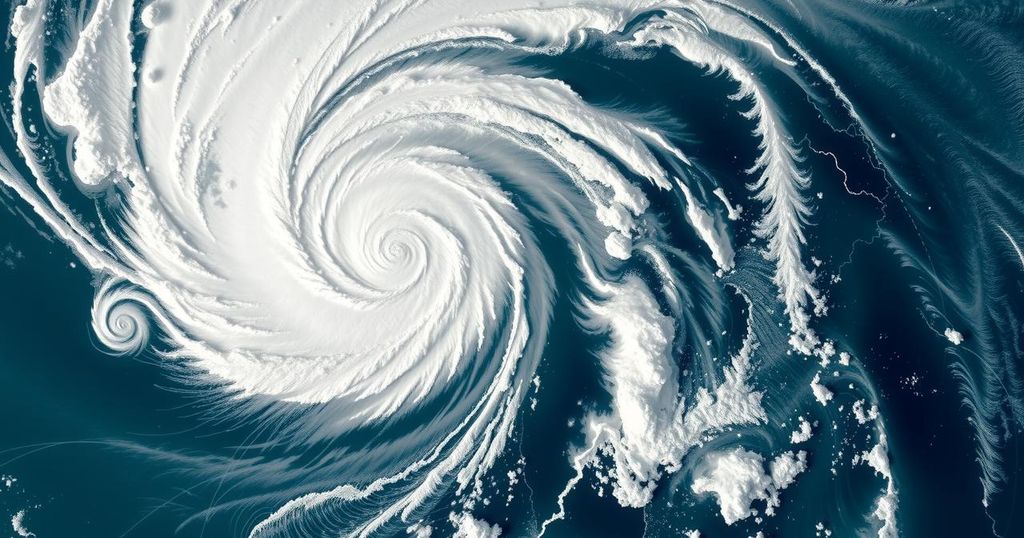Tropical Storm Dikeledi Devastates Mozambique Following Deadly Path Through Madagascar

Tropical Storm Dikeledi struck northern Mozambique, following its impact on Madagascar where three fatalities were reported. Dikeledi brought severe winds and heavy rainfall, prompting flood warnings and urgent safety measures from authorities. The storm’s intensity is connected to rising sea temperatures, indicative of a concerning trend in global warming and climate patterns impacting the region.
Tropical Storm Dikeledi made landfall in northern Mozambique on Monday, resulting in significant devastation after causing fatalities in Madagascar and triggering floods in Mayotte. The storm strengthened upon reaching Nampula, Mozambique, with destructive winds and severe rainfall reported. Recent weather forecasts from Meteo-France predict substantial flooding, with estimates of rainfall up to 200 millimetres (approximately eight inches) within a 24-hour period and wind gusts reaching 180 kilometres (110 miles) per hour. The storm follows the destruction caused by Cyclone Chido in December, which claimed over 120 lives in northern Mozambique.
In light of the approaching storm, President Filipe Nyusi has urged citizens in the storm’s path to take immediate precautions, including seeking shelter and storing food and water. “Go immediately to a safe shelter and stay there until the authorities give you further instructions,” he stated during the parliamentary opening in Maputo. Meanwhile, the National Office for Risk and Disaster Management in Madagascar reported the deaths of at least three individuals due to the storm, which initially impacted the northern part of the island as a cyclone over the weekend. As Dikeledi progresses southwards, further warnings have been issued for Madagascar’s southwest coast.
This year’s tropical cyclone season, spanning from November to March, has highlighted increased storm intensity, attributed to elevated surface water temperatures in the Indian Ocean, where readings are nearing 30 degrees Celsius (86 degrees Fahrenheit). This phenomenon is emblematic of broader global warming dynamics observed in other oceanic regions, such as the North Atlantic and the Pacific. Overall, the situation remains critical as the storm continues to affect multiple regions.
Tropical storms such as Dikeledi frequently occur in the Indian Ocean, particularly from November to March, with increasing intensity influenced by climate change. This season has already seen considerable tragedies, including Cyclone Chido, which devastated northern Mozambique in December and left hundreds dead or injured. The impacts of these storms can involve catastrophic flooding, destruction of infrastructure, and loss of life, necessitating urgent government responses to protect residents in affected regions. The current tropical cyclone activity is exacerbated by higher sea surface temperatures, a consequence of global warming that enhances storm development. Mozambique’s vulnerability to such natural disasters is a chronic concern, and the nation’s meteorological agencies are tasked with predicting and mitigating the damage from such powerful weather events. Recent storms highlight the need for community preparedness and effective communication from authorities, particularly as storms like Dikeledi move towards populated coastal areas.
In summary, Tropical Storm Dikeledi’s impact on Mozambique underscores the heightened risks associated with seasonal tropical cyclones, particularly in light of climate change. The government has taken measures to protect residents by issuing warnings and advising on safety protocols. Historical data reveal an ongoing pattern of increased severity in storms, leading to heightened preparation requirements for communities likely to encounter such disasters. The combination of severe weather phenomena such as Dikeledi exacerbates existing vulnerabilities, necessitating continual vigilance and robust disaster response strategies.
Original Source: www.barrons.com






